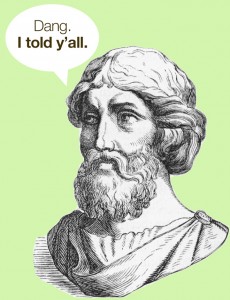As urban planners, we must not only innovate, but make our innovations count in the marketplace of ideas. We must make the benefits of livability easily understood, with a clear path for making them happen. Scott Doyon encourages rooted innovation.
 "Yes, overall, planners have gotten better at articulating projects and the larger goals that drive them. They’re more adept at clarity, helping people envision certain outcomes. But by and large, they still operate with an apparent assumption that they and their audience are on the same page.
"Yes, overall, planners have gotten better at articulating projects and the larger goals that drive them. They’re more adept at clarity, helping people envision certain outcomes. But by and large, they still operate with an apparent assumption that they and their audience are on the same page.
"That’s not always true. And it wouldn’t surprise me a bit if it became less true in the coming years. Here’s why:
"The urbanist proposition is nicely timed right now, as a variety of issues — energy costs, commute times, Millennial interests, etc.— have converged to make cities more attractive. People are seeking particular experiences and cities are delivering them. But now, in the course of our ongoing urban renaissance, a lot of cities are transitioning from the problems of failure to the problems of success. Increasingly, disadvantaged populations with limited political voice are sharing their surroundings with newly-arrived, more affluent populations. Populations more inclined to bring their NIMBY instincts with them when they move in-town. And act on those instincts when they discover they now reside in an environment inclined towards a state of evolutionary flux for the foreseeable future."
FULL STORY: Selling Urbanism: Don’t be an Aristarchus

Planetizen Federal Action Tracker
A weekly monitor of how Trump’s orders and actions are impacting planners and planning in America.

Chicago’s Ghost Rails
Just beneath the surface of the modern city lie the remnants of its expansive early 20th-century streetcar system.

San Antonio and Austin are Fusing Into one Massive Megaregion
The region spanning the two central Texas cities is growing fast, posing challenges for local infrastructure and water supplies.

Since Zion's Shuttles Went Electric “The Smog is Gone”
Visitors to Zion National Park can enjoy the canyon via the nation’s first fully electric park shuttle system.

Trump Distributing DOT Safety Funds at 1/10 Rate of Biden
Funds for Safe Streets and other transportation safety and equity programs are being held up by administrative reviews and conflicts with the Trump administration’s priorities.

German Cities Subsidize Taxis for Women Amid Wave of Violence
Free or low-cost taxi rides can help women navigate cities more safely, but critics say the programs don't address the root causes of violence against women.
Urban Design for Planners 1: Software Tools
This six-course series explores essential urban design concepts using open source software and equips planners with the tools they need to participate fully in the urban design process.
Planning for Universal Design
Learn the tools for implementing Universal Design in planning regulations.
planning NEXT
Appalachian Highlands Housing Partners
Mpact (founded as Rail~Volution)
City of Camden Redevelopment Agency
City of Astoria
City of Portland
City of Laramie


























